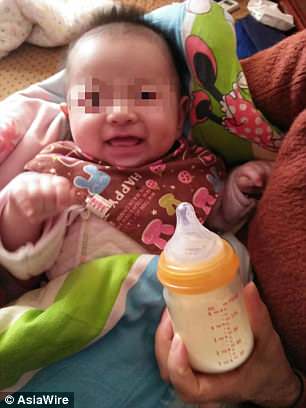Chinese media has reported a surrogate mother gave birth to a baby boy in China four years after his parents died in a car crash.
The deceased were undergoing fertility treatments before the accident occurred in 2013.
The couple’s parents fought a legal battle to gain access to the couple’s fertilized embryos kept in a hospital in the Eastern city of Nanjing.
According to reports from Beijing News, the baby boy nicknamed ‘Tiantian’ or ‘sweet’ in Mandarin was born on December 9 to a Laotian surrogate.
Surrogacy is illegal in China, forcing those who can afford it to look for potential options abroad.
‘He’s always smiling. His eyes are like my daughter’s, but he looks more like his dad,’ new grandmother Hu Xingxian, told the state-run newspaper.
The grandparents had to clear several hurdles to transport the embryos out of China and prove the paternity and nationality of the baby once it was born.
‘First we thought of using air freight, but none of the airlines were willing to take the thermos-sized bottle of liquid nitrogen where the four embryos were stored,’ Liu Baojun, a surrogacy expert who assisted the families, told The Beijing News.
So the families decided to transport their precious cargo by road to Laos, where commercial surrogacy is legal.
The next problem was getting the baby back into China. Children born through surrogacy outside the country need to have a DNA test proving that one of the biological parents is a Chinese national.
To get around the issue, the Laotian surrogate mother was brought to China on a tourist visa and the families arranged for her to give birth at a private hospital in the southern city of Guangzhou.
The child was kept in the hospital for 15 days, until all four grandparents gave blood and DNA tests, establishing the baby was indeed their grandson and that both parents were Chinese nationals.
The landmark ruling that allows parents to inherit frozen embryos created by their children has triggered a wide-ranging debate on Chinese social media.
Dozens of commentators said it highlights the plight of parents who have lost their only child under China’s controversial one-child policy. Others discussed the need to legalize surrogacy.
‘This is a family that is rich and capable. But, there are many others that have lost their only child. Shouldn’t the government offer them any support (for the price they´ve had to pay) for complying with family planning policies?’ asked one commentator on Twitter-like microblog Weibo.
The three-decade-long restriction on family size was replaced by a two-child-rule in 2016.
Tiantian’s grandfather Shen Xinnan told The Beijing News that he will wait until the boy is ‘older and wiser’ before telling him what happened to his parents .
‘In the meantime we will say his mum and dad are living abroad,’ Shen said. ‘We will definitely tell him what happened — what choice do we have?’
















